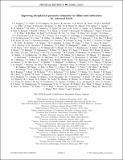Improving astrophysical parameter estimation via offline noise subtraction for Advanced LIGO
Author(s)
Vitale, Salvatore; Evans, M.; Fritschel, Peter K.; Barsotti, Lisa; Biscans, Sebastien; Fernandez-Galiana, A.; Gras, Slawomir; Hall, Evan D.; MacInnis, Myron E; Martynov, Denis; Mason, Kenneth R; Matichard, Fabrice; Mavalvala, Nergis; McCuller, Lee P; Mittleman, Richard K; Shoemaker, David H; Tse, Maggie; Weiss, Rainer; Yu, Hang; Yu, Haocun; Zucker, Michael E; ... Show more Show less
DownloadPhysRevD.99.042001.pdf (578.1Kb)
Terms of use
Metadata
Show full item recordAbstract
The Advanced LIGO detectors have recently completed their second observation run successfully. The run lasted for approximately 10 months and led to multiple new discoveries. The sensitivity to gravitational waves was partially limited by laser noise. Here, we utilize auxiliary sensors that witness these correlated noise sources, and use them for noise subtraction in the time domain data. This noise and line removal is particularly significant for the LIGO Hanford Observatory, where the improvement in sensitivity is greater than 20%. Consequently, we were also able to improve the astrophysical estimation for the location, masses, spins, and orbital parameters of the gravitational wave progenitors.
Date issued
2019-02Department
Massachusetts Institute of Technology. Department of Physics; Massachusetts Institute of Technology. Laboratory for Nuclear Science; LIGO (Observatory : Massachusetts Institute of Technology)Journal
Physical Review D
Publisher
American Physical Society
Citation
Driggers, J. C. et al. “Improving Astrophysical Parameter Estimation via Offline Noise Subtraction for Advanced LIGO.” Physical Review D 99, 4 (February 2019): 042001 © 2019 American Physical Society
Version: Final published version
ISSN
2470-0010
2470-0029